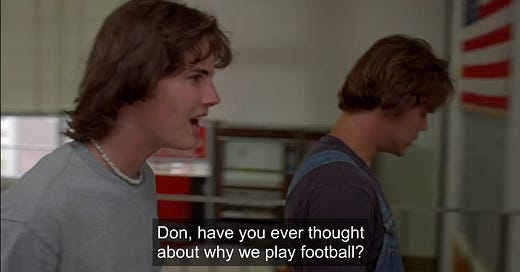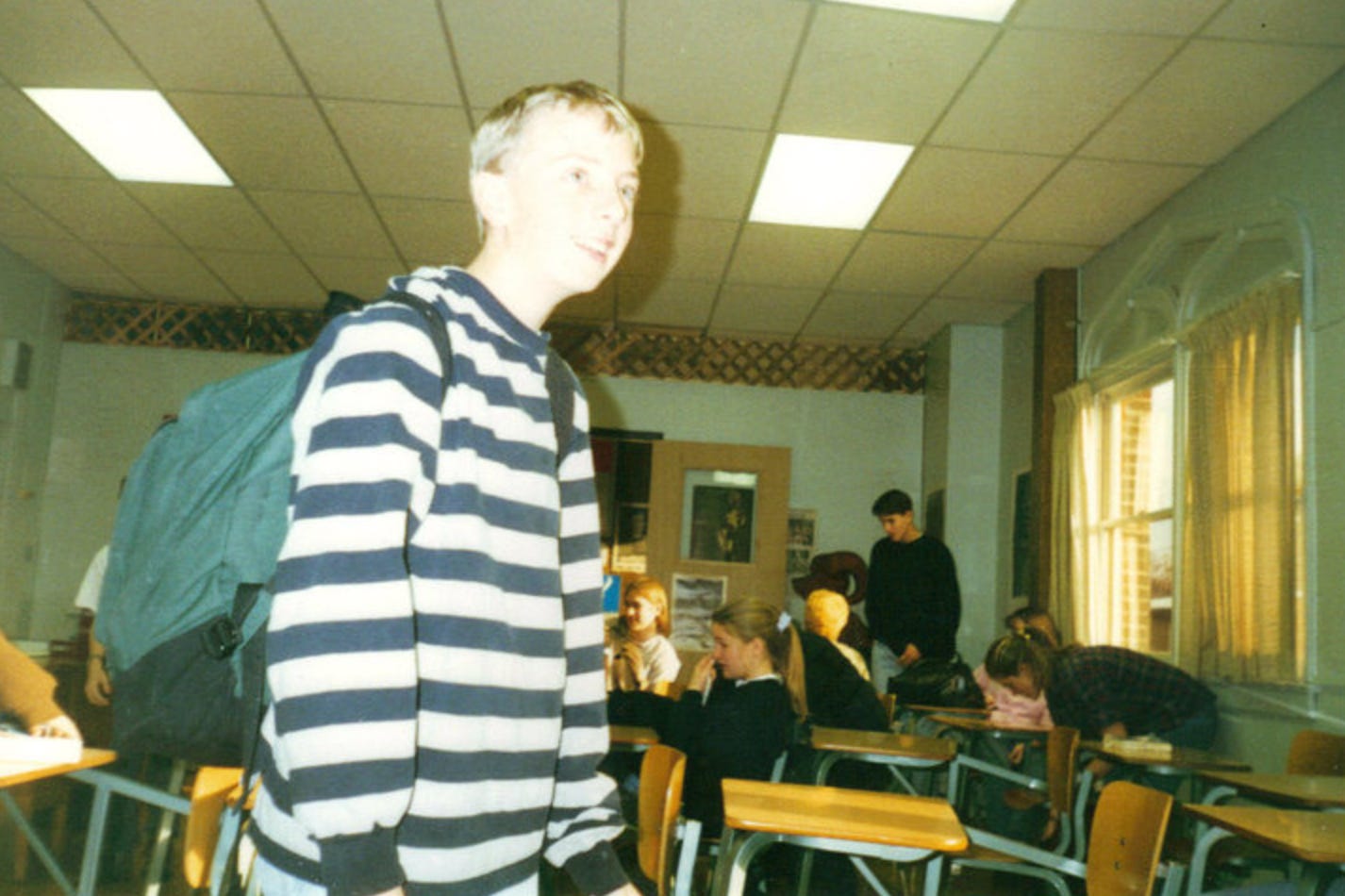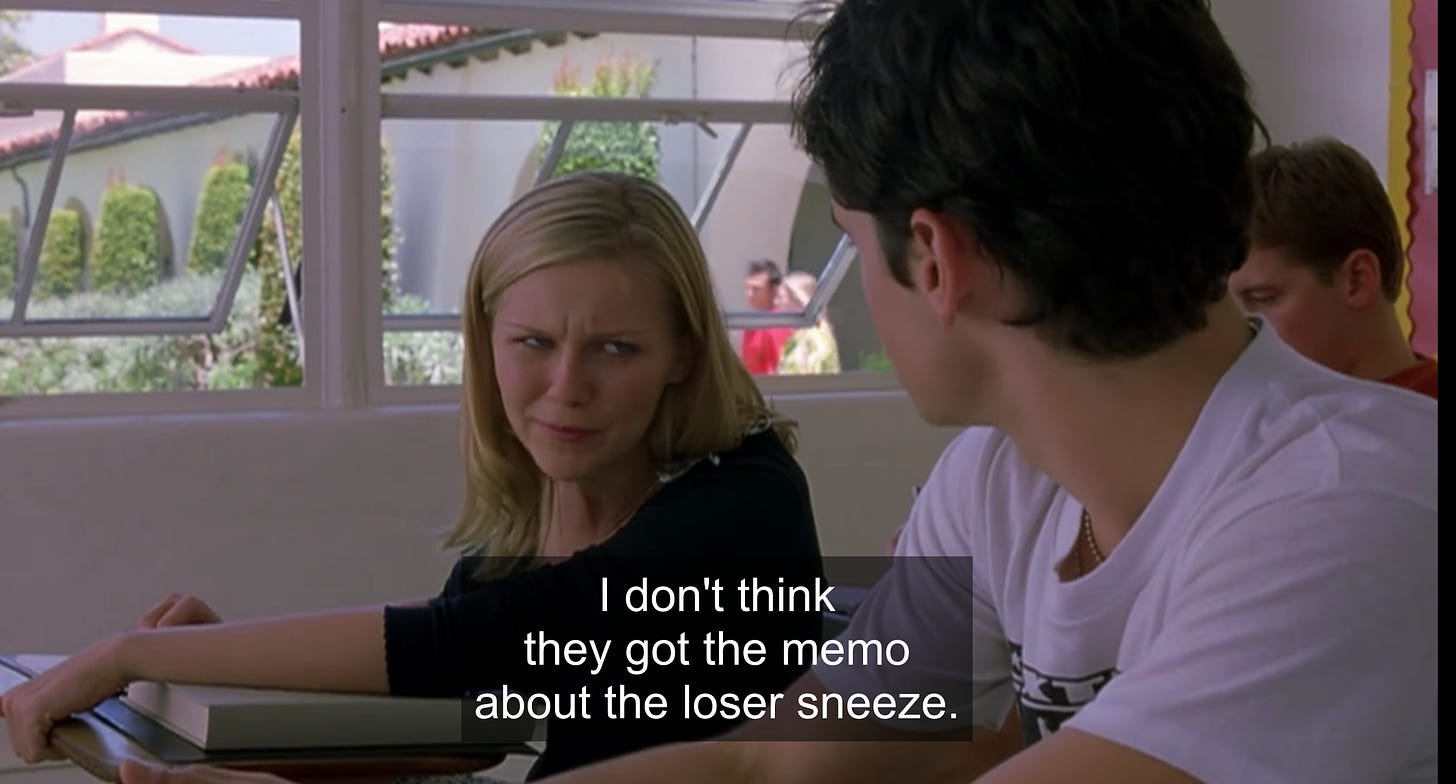The internet is like a dysfunctional friend group’s cursed gift exchange. Various pieces of `content are removed from their packaging, played around with for a bit before being re-wrapped and shuffled onto the next recipient. Youtube videos go randomly viral and then disappear into the ether. Years later, clips from those videos are chopped up for Tik Tok. Those smaller clips are then blessed with shiny new captions and shuffled off to Twitter. I can only assume that four years later, those same clips will somehow show up on Linkedin with the hashtag #productivityhack or #hiring before finally landing on a “Midcentury Modern Design Ideas” Pinterest board.
I share all this because there’s no other good explanation for why, earlier this week, my forty-year-old eyeballs were glued to a circa-2015 video of then-teenagers in suburban Kansas City debating the pros and cons of the Confederate flag. I guess that, judging from the Twitter caption that delivered the video my way, I was supposed to be enchanted by this video because the then-teen who shares my politics had better arguments than the then-teens on the other side. Now, I generally try to avoid that particular brand of worldview validation. Goodness knows teens— either past-teens or current-teens—- should be allowed to just, you know, do their thing. Driver’s ed and prom and contraband alcohol procurement are stressful enough without having to add my adult political ego into the mix.
And yet… while I didn’t watch a six-year-old video of high school students whom I’ve never met for that reason, you’d best believe that I still watched it. I couldn’t look away, in fact! I kept watching these kids and wildly projecting my own half-memories of my high school social dynamics onto them. Which is unfair! I don’t even go there! I have no clue who was or wasn’t friends with whom after the debate ended. What I do know, though, is that 90% of the young white dudes involved took the more libertarian-conservative-screw-your-feelings side of the argument. Those dudes, in turn, appeared to be chummy with each other and generally sported various varsity-team-issued apparel. I also know that the more liberal-inclusive-perhaps-we-shouldn’t-wantonly-hurt-other-people’s-feelings team was disproportionately composed of young women, save for a couple of dudes who, it would appear, were well outside of the Dominant Bro Friendship Matrix (one of whom was the aforementioned good argument maker).
Again, I don’t know anything about these once-teens and their social dynamics. It’s the projection that matters, though. None of my fascination really has anything to do with them specifically. It’s about how quickly this glimpse of a high school classroom and a circular civics debate about a hot button issue took me back to my own political awakening and to the broader question of what it is we’re even doing when we debate politics with one another.
I was a teen once. An earnest one! A teen who debated politics! And a lot of that was good— just one more awkward but endearing after-effect of having been raised in a civically-minded, social justice-inclined household. But it was never just about that. The socialist t-shirts and the impassioned essays about Nike sweatshops and the dropping of Public Enemy quotes into class discussions were, as with all teenage affectations, as much about the sweaty, self-conscious negotiation of what kind of person I was going to be as they were about making my community better.
It should surprise nobody that teenage me was into wearing my leftist politics on my sleeves. The figure I cut was less handsome and brooding and more Muppet-esque, a study in ill-fitting clothes and flailing limbs. I was attracted to girls but much more successful at befriending them than convincing them that we should, like, make-out or something. I didn’t drink (one part church youth group, one part Minor Threat) nor did I drive a cool car (I drove no car, in fact… I rode my bike to school). I overestimated (then as now) how much social capital could come from “knowing the names of a lot of bands.” I was funny and (I think) decently charismatic as far as teenagers go but let’s be very clear— I was no teen movie’s leading man.
It was very clear, early on, that I wasn’t going to be successful in impressing the bros at my school— the guys who went hunting with their dads and who convinced our PA announcer to do Jock Jams intros for their varsity basketball games and who, puzzlingly, invented a game during lunch whose sole purpose was to see how hard they could throw a baseball at each other’s crotches. So, if that wasn’t in the cards, that meant that the only direction I could go was to differentiate myself from them as much as possible: Those dudes shot animals for fun? Ha! I became a vegetarian! They made fun of two seniors who they suspected were lesbians? Ha! I’d go with those girls to an Indigo Girls concert! They’d do stupid racist war whoops when we’d play schools from the rez? I’d flash around a copy of Custer Died For Your Sins! Do I regret the kindness and empathy of those moves? Of course not! But I also have to admit— they were never actually about any better-world end-goal. They were about establishing myself, in other people’s eyes, as being distinct from the Bad Mean Guys.
We all know this, of course. A lion’s share of what it means to be a teenager is this flailing, self-conscious, look-at-me-but-not-too-hard attempt to define the kind of person we’re going to be for the rest of our lives. And goodness knows, if that’s a thing we do, that it’s better if the hills we die on are kinder rather than more malevolent. Also, the great thing about being a teenager is that you eventually grow up and are no longer a teenager and, as such, you can look back at the rigidity of the boxes you drew for yourself and others and cast them aside. I missed my last high school reunion, but the report from all those who attended was that it was deeply cathartic— everybody went with this fear of being judged for the worst of their high-school-era excesses or cruelties and left pleased to discover that bygones had long since been allowed to be bygones. I’ve connected with a fair number of those high school bros and, to a T, those interactions have been full of grace and forgiveness and delight in the kind of grown-ups we’re all trying to be.
If you’ve been around these parts for a while, you’ve definitely heard my various whinings about the extent to which White American liberal politics is more about class-and-educational signaling than it is about the actual act of making our society more livable and just (and, in turn, the way that in-group signaling reinforces White conservative reactionary “own the libs” dog and pony show). The reason why I’ve been unable to look away this week— either from that high school debate video or from the various grown adults I witnessed cheering it on— isn’t just in service of further deepening that worry. The gift of this particular mental rabbit hole is that I’m now thinking not merely about the fact of this collective performance, but of what it would look like to excavate its roots.
On one hand, that excavation isn’t hard. It’s always capitalism right? It’s always the perpetuation of existing power structures? And yes, of course. Ours is a country that has deliberately and consistently encouraged performative identity politics in its White population, particularly its working class population, as a ready pressure release valve against any popular political movements that might threaten wealth and power. Ours is a country where powerful interests have always sought to eliminate any collective forms of political action that might offer real, tangible change (labor unions, more radical religious groups, community-centric activists like the Black Panthers and Young Patriots) but are more than happy to allow us to do whatever-it-is-we-do-to-each-other-online. Come on, U.S.A., baby… bluster and vitriol… it’s what we do!
But what that correct-but-predictable answer doesn’t get at is how and why we learn to take the bait? Why is it that, even when we know that American political discourse is too often merely a rhetorical game designed to ensure acceptance in our various little micro-communities, we still willingly play the game? When and how does that develop and, more importantly, what are our opportunities to unlearn it?
I don’t think I have a working theory for all this quite yet. What I do have, though, is a set of questions.
-When do white Americans first decide that our political beliefs (including, for some, our abstinence from “politics) are key identity markers? How does that differ by class and geography? Why?
-When did you personally start developing a political identity? Why? When you look back on that story, what is inspiring about it? What, in retrospect, feels limiting or perhaps self-centered about it?
-When did you learn to start to avoid or distinguish yourself from people with the wrong political opinions? [Note: I want to make a distinction here, as I’m not asking, “when did you learn to try to keep yourself safe from people whose beliefs were directly harmful to you— ie. being a BIPOC person avoiding racists, a queer person avoiding homophobes, a woman avoiding misogynists?” I’m asking specifically when and why you learned to avoid people who weren’t harming you directly but whose beliefs you believed to be retrograde?].
-Why do white progressive parents care whether or not they are “raising anti-racist kids?” [I ask that not as a leading question— I know for myself there are lots of empathetic threads to my particular answer (I want my kids to cause less harm than I have, for example)— but I do know I can’t answer that question honestly without other threads—about my own self-consciousness as a parent, about how I fit in with me peer group— also revealing themselves].
-What would it look like if, instead of learning to debate, American students learned to wrestle with the reality of problems in their communities? [To cite one example, what if, instead of getting to perform their pre-existing positions about the Confederate flag for each other, students like the ones in the video had to examine what contemporary and historical decisions kept the metro area in which they lived segregated and unequal? Would that teach us something different about politics or would the gravitational force of the performance be too strong?].
-What would it look like to teach our kids that true communities involve both accountability for harm-caused as well as a spirit of forgiveness, grace and a welcoming-back when bonds are broken? What would it look like to allow them to practice that together?
-In what ways does a focus on our beliefs or ideologies matter and in what ways does it distract from the question of the positive or negative impact each of our actions are having in the world?
I wouldn’t pose these questions if I wasn’t actually interested in the answers, if I wasn’t actively playing with them myself. I am realizing, increasingly, that it’s not enough to merely name the problem of our overly-performative politics again and again… it’s time also to get deeper at the root. If those questions spur anything for you— I’d love to hear from your thoughts. Emails are cool, and I’m also realizing that I should probably do a better job of encouraging folks to leave a comment (is it uncool of me to drop a “comment” button right here? sure, but nevertheless…).
We did not become a nation of political poses out of thin air. It is not by accident that we are now a country where vaccinated conservatives lie to their friends about having gotten the shot and decidedly non-liberatory but cosmopolitan corporations quote Baldwin and celebrate Marsha P. Johnson. I’m only beginning to uncover where and how we learn these patterns. Already though, I can tell that doing so offers the great freedom of potential unstuckness. If, at some point, perhaps in adolescence, perhaps even earlier, we learn that politics is a show we put on for each other, that means that show isn’t inevitable. Even better, that means that at some point down the road, we can learn to make our politics not about how we look but about actually leaving the world better than we found it.
End notes:
While I’m deliberately ending this newsletter with questions rather than pat answers, I’d be remiss if I didn’t highlight a few organizations who I think are practicing politics in majority-White communities in ways that disrupt these in-group-signaling patterns. First up is Reclaim Idaho, a scrappy band of Gem Staters who, after being told there was no way they coudld convince their conservative neighbors to support Medicare expansion, got in a green RV and made it happen. They’re now repeating the process for increased school funding. The second is Southern Crossroads, and more specifically the Bedford County (TN) Listening Project, who are doing tenant organizing in rural communities that have been historically been prayed on by folks with money and power.
This week’s song: “Damnit” (Blink 182 Cover) by Ruston Kelly. Thank you, as always, for reading this week’s… report/on losing/and failing…[and white people’s relationships to each other]... I guess this is growing up.







Thank you for this, it is insightful with always, and I'll be sharing it with friends, especially some who I've been lucky enough to have stick around as I grew up from also being extremely this same type of teenager.
With regards to your third question, learning to discern between "distinguish[ing] yourself from people with the wrong political opinions" and "try[ing] to keep yourself safe from people whose beliefs were directly harmful to you" is really something I am still working on. Growing up gay/trans in a conservative rural area, I grew up associating these two things very closely, and often get an "I'm in danger" feeling when I engage with someone with "wrong political opinions", and it's definitely often very unhelpful!
When I see adults lean really hard into the "performance of correct politics" thing, I often see a trauma reaction in there, and understand how compelling it is to think of things in very binary, good/bad terms and to be desperate to place yourself on the "good" side. This isn't to excuse that behaviour, which can play into some really nasty stuff, but it's one I have compassion for, especially as I often see it arise among people who've been through some shit. I really appreciate work like yours that helps illuminate ways to deal constructively with one's own hangups in order to better connect with and work in solidarity with other people.
so much to ponder with your writing and, thank you, Garrett. I'm in a training today, so not enough time to really think this through...However, you are pushing me in a very good way and thank you.